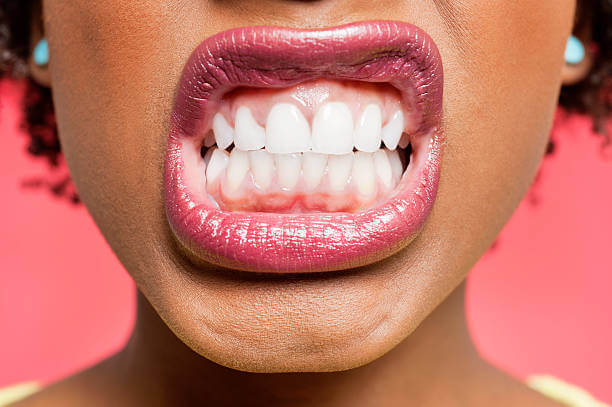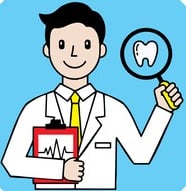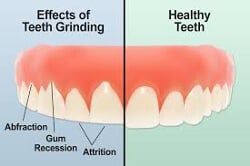It’s common for people to clench their jaw during the day, especially when experiencing anxiety or strong emotions, like anger and sadness. It’s usually a subconscious physical reaction to a psychological stressor.
However, it can become a habit if you are under regular stress. And, over time, it can cause pain in your temples, jaw, ears, and teeth. It can even lead to headaches, tooth damage, and TMJ disorders.
So, it is important to identify whether you might be experiencing this issue.
Recognize the symptoms.
One of the most common symptoms of clenching or grinding is a tension headache that arises from the sides of the neck or near the temples. You may also feel pain in the back of your head as the tension spreads to affect more muscle groups.
If you suffer from fairly frequent headaches, try pressing your fingers into the muscles around your jaw: the ones along the sides of your neck, by your ear, and tucked just behind the curve of the jaw. Press gently at first in case they’re very tense. If you feel tenderness or pain, it means you’re carrying tension in this area of your body.
Other signs of jaw tension can include a clicking sound in the jaw when you open or shut it. You may even have trouble opening your mouth all the way. Sometimes, this is due to improper alignment, and you should discuss treatment options with your doctor and dentist.
You may also find you have problems with your teeth, such as flattening, chipping, or increased sensitivity to hot and cold. That’s because clenching often goes hand-in-hand with grinding your teeth (either during sleep or subconsciously while awake).
If sharing a bed or room with someone, ask them if they ever hear you grinding your teeth. Audible teeth grinding indicates you have a significant issue. However, even if you are just clenching, the pressure can still affect your teeth and gums. So, you must take steps to treat the problem.
See if you can find the source of your stress.
Stress is the biggest contributor to jaw clenching issues. If you can identify the stress in your life, ask yourself what steps you might take to ease the pressure on yourself.
If the problem is an interpersonal issue with someone close to you. Try improving communication patterns, seek ways that you can be there for each other, or find helpful compromises. Ask for help from supportive people in your life or seek professional guidance from a therapist.
If your stress is work-related, ask yourself what you can do to make the experience better. Do you have a toxic boss? Do you work too many hours? Are you in a career that is overwhelming you or not satisfying you?
These are big questions to answer and can be intimidating problems to solve. So, again, seek advice, make a list of priorities for your life, and give yourself room to breathe and make a wise decision. After all, stress is probably affecting your body and health in more ways than one. So, the issue deserves your attention and care.
Practice relaxation techniques.
In addition to addressing specific stresses, you should find ways to bring more relaxation into your routine. You might introduce a gentle wind-down before bed or when you get home from work.
Try doing some that involve your body: stretching, light exercise, a walk outside, breathing exercises, or meditation poses. Stress travels quickly from the brain into the body, and it can be hard to eliminate without putting time, energy, and some physical movement into the task. You can also try adding regular or semi-regular relaxing treatments, like a facial or a massage, to your monthly schedule.
And when you are in a moment of stress, remember the importance of breath. Staying aware and taking control of your breathing helps to ground you in your body so that you can work through stress more easily. Without staying grounded, you often lose track of what your body is doing, and you wind up tensing your muscles.
If you’ve pinpointed where you carry stress, imagine your breath traveling to that place, filling it, and releasing it. The jaw is a frequent place to carry tension, but so are the neck, shoulders, forehead, and abdomen. So, check-in with your whole body when you’re feeling increased worry or anxiety.
Take preventative measures.
If you’re clenching your jaw during the day, you are certainly doing it while you sleep, and maybe even grinding your teeth. Because this can cause a lot of damage over time, it’s important to take preventative measures to protect your teeth and gums. The best course of action is to get yourself fitted for a custom night-guard. You can do this at the dentist or by ordering directly from TeethNightGuard.
JOIN OUR NEWSLETTER! RECEIVE PROMOTIONS & COUPONS FOR CUSTOM DENTAL NIGHT GUARDS
INTERESTED IN BECOMING AN AFFILIATE OF TeethNightGuard.com?
Earn 15% commission for simply sharing with your friends and family through email or social media such as Facebook, Reddit, or Twitter. Sign up and learn more here: https://www.teethnightguard.com/pages/register-affiliate-account
HARD FLEXIBLE DUAL LAYER 2MM CUSTOM NIGHT GUARD

$149.99
Item Number PROACRYLIC Manufacturer Sparkling White Smiles Dental Lab Rating Product Description 2mm Hard Flexible Dual Layer is a very strong and hard teeth grinding guard with made with an innovative material that is flexible for comfort. Our Custom Teeth… Read More
 We Offer Prompt Customer Service Through
We Offer Prompt Customer Service Through 











